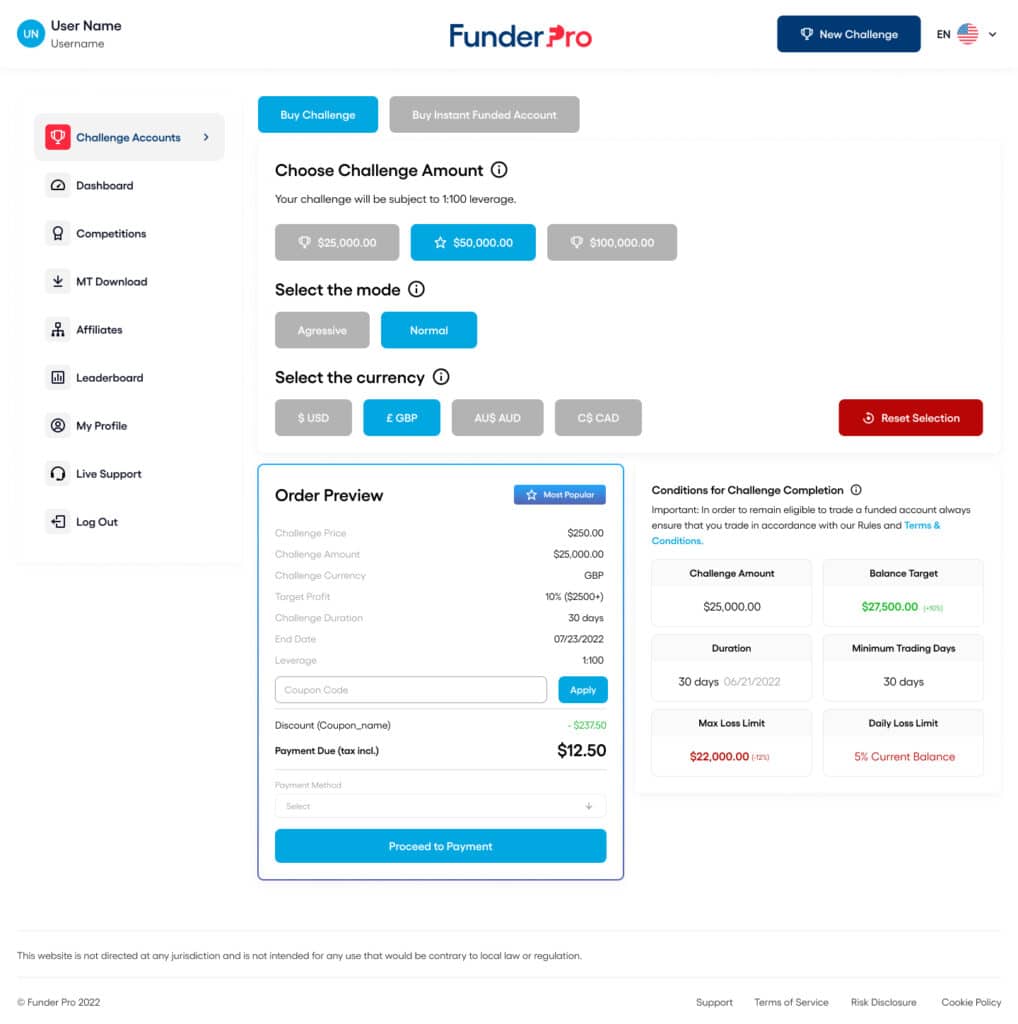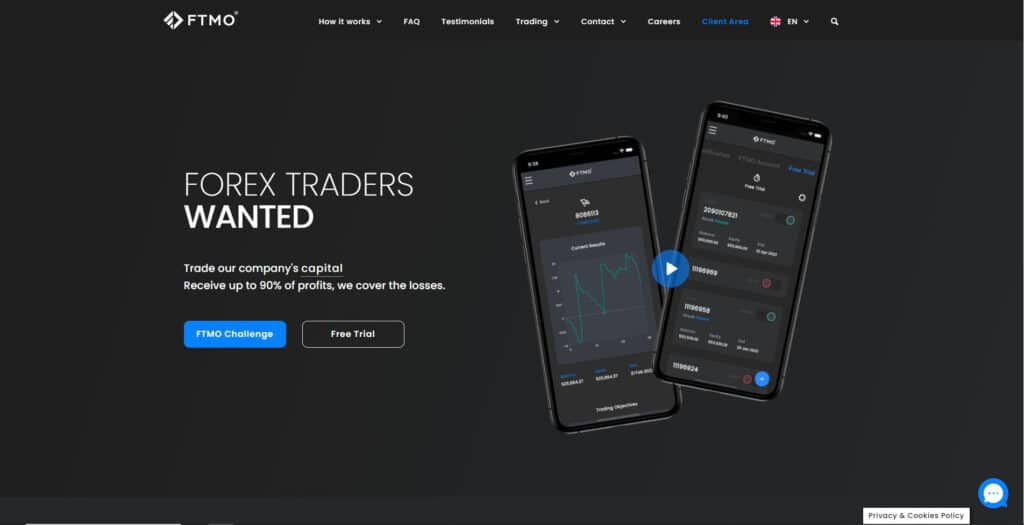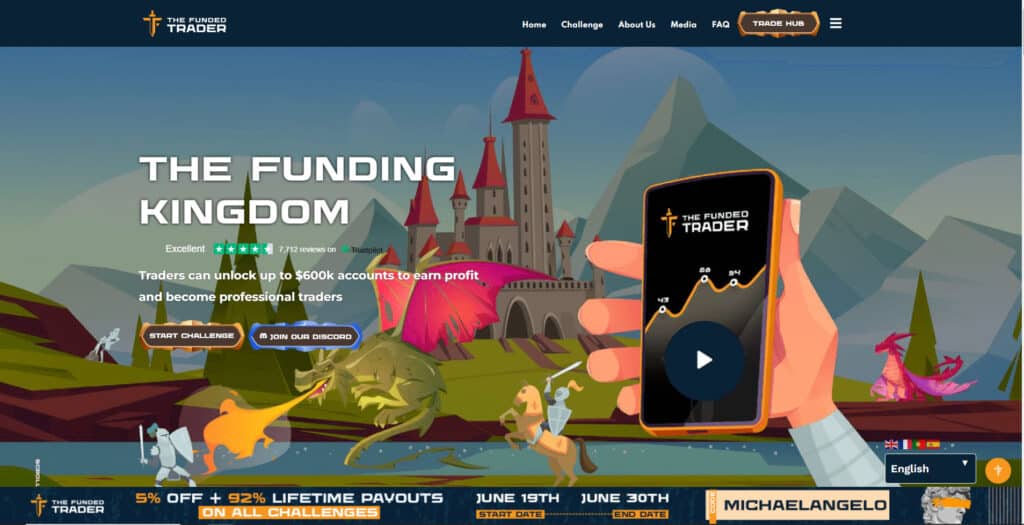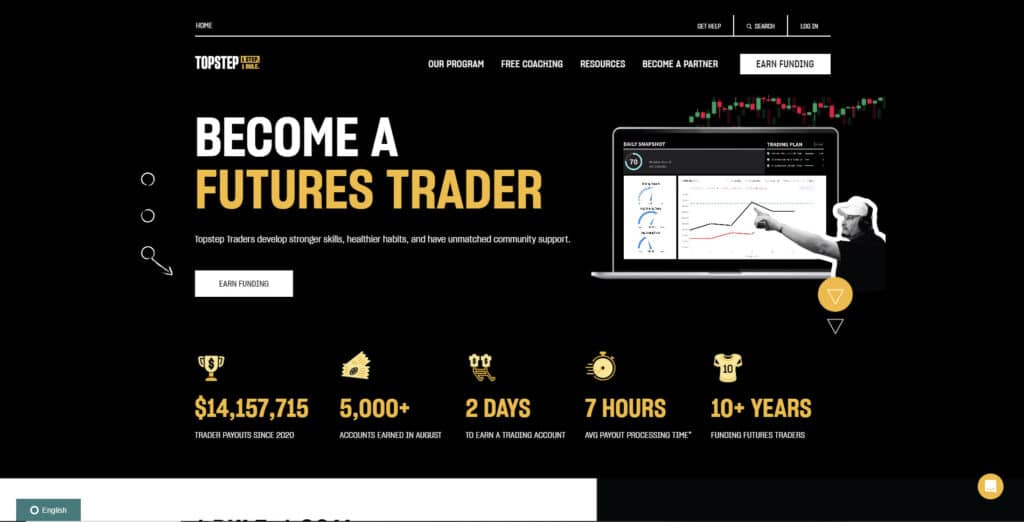Funded Trading Accounts
Funded trading accounts have become increasingly popular in recent years as an alternative way for traders to access capital to trade financial markets. As traders, it is important for us to have a knowledge of them and how they work, taking into account all potential options we have. Here, we will explore what funded trading accounts are, how they work, and the pros and cons of using one. To see our list of Funded Trading Programs click here.
- What is a Funded Trading Account?
- How do Funded Trading Accounts work?
- Is funded Trading worth it
- Types of Trading Accounts
- What makes a good Funded Trader
- What Are The Pros and Cons of a Funded Trading Account?
- Different Types of Funded Trading Programme
- 1. Profit Sharing
- 2. Loss Limits and Risk Management
- 3. Subscription Model
- 4. Combination of Fees and Profit Sharing
- 5. Evaluation Periods
- 6. Asset Class Specific
- 7. Scaling Capital
- 8. Remote Traders vs In-House Traders
- Choosing the Best Funded Trading Programme
- TradeDay Review
- FunderPro Review
- FTMO Review
- The Funded Trader Review
- Topstep Trader Review
- Funded Trading Account Takeaways
What is a Funded Trading Account?
A funded trader program or trading account can be a valuable asset for semi-professional traders, providing them with the necessary risk capital, leverage, and trading power to generate profits in the financial markets. Traditionally, it is a type of account where a third party, such as a proprietary trading firm or a hedge fund, provides capital for the trader to trade with. In return, the trader agrees to share a portion of the profits they make from trading. Whether funded accounts or trading programs are used as a primary or secondary source of equity, a funded account program or trading account can be an invaluable tool for astute traders looking to make a living in the financial markets, who often would not have the required capital to do so without such funded trader programs or funded accounts themselves.
How do Funded Trading Accounts work?
The process of accessing a funded trading firm or account is straightforward, but not necessarily easy. Traders typically apply for a funded trading account with a proprietary trading firm, but the application process usually involves passing a trading evaluation or meeting certain performance criteria. These will differ from prop trading firm to prop trading firm, with some being more vigorous than others.
To become a funded trader, the first step is to pass an under evaluation accounts phase, commonly known as a “challenge” or “combine” evaluation account. During this time, traders must demonstrate profitability while operating within pre defined risk management guidelines. The challenge typically requires achieving a specific level of profitability over a defined period, such as generating 10% profits while avoiding a 5% drawdown of initial balance over a 20-day period, for example.
Upon successful completion of the challenge, traders are eligible for a funded account. While additional evaluations may be necessary, the trader and prop firms can begin trading in live accounts with the funded account soon. In this phase, the funded trader and prop firms adheres to the same risk management rules and parameters as in the challenge while trading in the live markets. If they make profits, the gains are divided between the trader and the prop firm according to an agreed-upon profit split ratio. The profit splits can vary depending on the firm, ranging from the trader and prop firms taking home 50% to 70% of the profits.
Once a trader is accepted into the program, they are provided with a account that comes with a set amount of capital. The funded trader programs or professional trader then can use the capital to trade in the financial markets, typically with certain restrictions or guidelines set by the firm or fund. Often these restrictions are relatively loose, in order to give successful traders as much flexibility in the markets as possible. This allows them to trade a variety of financial instruments in almost any market they desire. This means that funded traders are free to target the most popular markets, including forex, futures, shares, and options. Additionally, funded traders can take advantage of the opportunity to trade multiple markets simultaneously. The funded trader programs agrees to share a percentage of the profits they make from trading with the firm or fund.
Is funded Trading worth it
Whether funded trading is worth it depends on various factors, including your level of experience, risk tolerance, and financial goals.
Here are some considerations to keep in mind when evaluating whether funded trading is worth it for you:
1. Experience and Skill Level
Funded trading can be beneficial for experienced and skilled traders who have a proven track record of success. If you’re a novice trader, it may not be the best option, as you’ll likely need to demonstrate your abilities before receiving funding.
2. Risk Management
Funded trading programs often come with specific risk management rules and profit targets that traders must adhere to. Make sure you understand and are comfortable with these restrictions before joining.
3. Trading Costs and Fees
Some funded trading programs charge fees or take a percentage of your profits. Consider the costs involved and ensure they don’t outweigh the potential benefits.
4. Psychological Pressure
Trading with someone else’s money can introduce additional psychological pressure, as the consequences of losses may be more significant. Ensure you can handle the emotional aspects of trading with external funds.
5. Availability of Capital
If you don’t have enough capital to trade with on your own, a funded trading program can provide an opportunity to access more significant sums.
6. Trading Independence
Some funded trading programs may limit your trading strategies or instruments. Ensure that the program aligns with your preferred trading style.
7. Long-Term Viability
Evaluate the long-term prospects of the funded trading program. Check for reviews and feedback from other traders who have participated in the funded trader program to gauge its reputation.
8. Alternative Options
Consider other alternatives, such as building your own account gradually, without buying power, without sharing profits with a proprietary firm.
Types of Trading Accounts
Funded Forex/CFD Trading Accounts
Funded Forex or Contract for Difference (CFD) trading accounts are a great option for traders looking to take advantage of the massive Forex and CFD market. With a funded forex trading account, forex traders have access to the necessary leverage and trading power to gear their exposure to trade forex, and potentially make a living from forex trading.
Both new and experienced traders can benefit from funded Forex/CFD trading accounts. Beginners can start an instant funded account with a training course on trading basics and Forex/CFD trading, while experienced traders can simply choose the size of their funded account challenge and begin trading to try to pass and get demo account funded. By starting balance passing a funded Forex/CFD trading account, traders can participate in the exciting world of Forex/CFD trading without risking their own capital.
For most of these funded Forex/ CFD trading account challenges, there is a monthly subscription fee. If the trader fails the challenge at any point, they can usually reset initial balance for the challenge, by paying a fee.
Funded Futures Trading Accounts
Funded Futures trading accounts offer traders the opportunity to trade futures contracts. This highly active market is suitable for those seeking trading opportunities with the potential for leveraged gains. Traders can obtain a funded futures account sized from $25,000 to $250,000 after being evaluated by a company.
Futures contracts are legally binding agreements that define the exchange of a specific quantity of a financial asset at a future time. Futures contracts are traded with high leverage and allow access to vital markets like the Chicago Mercantile Exchange (CME) and Euronext. Asset classes such as equities, energies, bonds, and metals are available. Futures products are inherently volatile and pose a substantial risk.
As with the funded Forex/ CFD trading account challenges, for the Funded Futures trading challenges there is a monthly fee to take part in the challenge. If the trader breaks a rule and the challenge is failed, they can in most instances buy a reset in order to start the challenge again.
What makes a good Funded Trader
Becoming a successful funded trader requires a combination of trading skills, discipline, risk management, and the ability to adapt to changing market conditions. Here are some key characteristics and practices that make a good funded trader:
Consistent Profitability
A good funded trader can demonstrate a consistent track record of profitable trading. Consistency is essential because it shows that the well funded trader’s success is not just based on luck but on a well-defined and tested trading strategy.
Risk Management
Effective risk management is crucial for a funded trader. They should use appropriate position sizing, set stop-loss levels, and manage risk to protect their capital from significant drawdowns and losses.
Adaptability
Markets are dynamic and can change rapidly. A successful funded trader can adapt their trading strategies and approaches to different market conditions, staying flexible and avoiding rigid adherence to a single approach.
Discipline
Funded traders must adhere to their trading plan and not let emotions drive their decisions. Sticking to a well-thought-out strategy, even during challenging times, is key to long-term success.
Patience
Good traders understand that not every day or trade will be a winner. They exercise patience and wait for high-probability setups to execute their trades.
Continuous Learning
Markets evolve, and a good funded trader keeps learning and improving their skills. They study market trends, review their trades, and stay up-to-date with news and developments that can impact their trading strategies.
Ability to Handle Pressure
Trading with someone else’s capital can add extra pressure, and a good funded trader can handle this pressure without letting it affect their decision-making negatively.
Transparency and Accountability
Funded traders are often required to report their trading performance and follow the rules set by the proprietary trading firm. A good funded trader is transparent about their trades, keeps accurate records, and takes accountability for their actions.
Realistic Expectations
Successful funded traders have realistic expectations about the time limit of their trading profits and the time it takes to grow their accounts. They understand that trading is not a get-rich-quick scheme but a long-term endeavor.
Professionalism
A good funded trader approaches trading as a profession and treats it with the respect it deserves. They maintain professionalism in their interactions with the trading firm and fellow traders.
Adherence to Rules
Funded trading programs often come with specific rules and guidelines. A good funded trader respects and follows these rules to maintain a positive relationship with the funding firm.
Remember that becoming a successful funded trader takes time, dedication, and continuous improvement. It’s essential to stay patient, committed to learning, and open to feedback and constructive criticism. With the right mindset and approach, funded trading can be a stepping stone to achieving your trading goals.
What Are The Pros and Cons of a Funded Trading Account?
Pros:
Access to capital: One of the main advantages of a funded trading account is that it provides traders with access to capital they may not have otherwise had. This can be especially useful for newer traders who may not have the capital to trade with.
Reduced risk: Funded accounts typically come with restrictions or guidelines on trading, which can help to reduce the risk of trading. Additionally, traders are only risking the capital provided by the firm or fund, rather than their own money.
Performance-based funding: Funded trading accounts are usually based on a performance-based funding model. This means that traders who perform well can receive additional capital to trade with, allowing them to potentially grow their account and profits.
Opportunity to gain experience: Funded accounts can provide an opportunity for traders to gain real-world trading experience with real money without risking their own capital or personal account. This can be particularly valuable for newer traders who are still learning the ropes and want to gain experience without the risk manager incurring significant losses to personal account.
Accountability: a funded trader accounts or account require traders to meet specific performance targets and risk management guidelines. This level of accountability can be beneficial for traders who may need additional discipline or structure to improve their trading performance.
Support and resources: Many funded trading firms offer additional resources and support to traders, including educational materials, such as webinars, mentorship, and access to proprietary trading tools and algorithms. These resources can help traders to improve their skills and become more successful in their trading activities.
Flexible work environment: Unlike when working for a firm, most trading programs will not require you to work from an office. Typically, internet access will be all that’s needed for one to trade, which is key in the ever changing work environment.
Cons:
Profit sharing: One of the biggest drawbacks of a funded trader account is that traders must share a percentage of their profits with the firm or fund that provided the capital. This can eat into profits and reduce the overall return on investment.
Limited control over the trading account: trading funded accounts typically come with specific trading rules, and requirements that traders must follow, such as a maximum drawdown limit or profit target. This can limit a trader’s control over their trading funded account, and they may not be able to execute their preferred trading strategies.
Evaluation process: The application process for a funded trading account can be rigorous and may require traders to meet certain performance criteria. This can be a barrier to entry for some traders.
Lack of transparency: Some funded trading firms may not provide clear information about their profit split ratios, fees, or other costs associated with the account. This lack of transparency can make it challenging for traders to evaluate the true value of the account and can lead to unexpected costs or fees. Firms also have the ability to change the terms and conditions of the agreement which can put off traders.
Additional fees: Some funded trading firms may charge additional fees for access to their trading platform or for using certain features. These fees can add up quickly and may further reduce a trader’s overall profitability.
Loss of independence: When trading with a funded account, traders are required to follow the rules and guidelines set by the firm or fund. This loss of independence can be a significant drawback for experienced traders who are used to having complete control over their trading activities.
Different Types of Funded Trading Programme
Funded trading models are various arrangements or structures that proprietary trading firms use to provide capital to traders. These models can differ in terms of the amount of capital provided, risk management rules, profit-sharing arrangements, and other terms and conditions. Some common funded trading models include:
1. Profit Sharing
In this profit split of model, traders receive a portion of the profits from other firms capital that they generate while trading the firm’s capital. The firm may take a percentage of the profits as their share. Profit-sharing ratios can vary significantly between different firms.
2. Loss Limits and Risk Management
Many funded trading programs impose strict risk management rules on traders. These rules may include maximum daily or weekly loss limits to protect both the trader and the firm from excessive losses.
3. Subscription Model
Some firms offer a subscription-based funded trading model. Traders pay a monthly fee or subscription to access the firm’s capital and trade with it. In this model, traders may keep all the profits they generate.
4. Combination of Fees and Profit Sharing
Certain funded trading programs combine a monthly fee or subscription with a profit-sharing arrangement. Traders pay a fee for access to the capital and then share a portion of their profits with the firm.
5. Evaluation Periods
Some funded trading capital programs require traders to go through an evaluation or trial period to demonstrate their trading skills and consistency. If they meet specific criteria during this evaluation, they become eligible for the firm’s trading capital amount.
6. Asset Class Specific
Certain funded trading firms specialize in specific asset classes, such as forex, stocks, futures, or cryptocurrencies. Traders may choose a program that aligns with their preferred asset class.
7. Scaling Capital
In this model, the amount of capital provided to traders may increase based on their trading performance. Successful traders may receive larger allocations of capital to trade.
8. Remote Traders vs In-House Traders
Some funded trading firms allow traders to work remotely, while others may require them to trade from the firm’s physical location.
It’s essential to carefully review the terms and conditions of any funded trading program you’re considering and ensure that the model aligns with your trading goals, risk tolerance, and trading style. Additionally, be wary of scams or overly aggressive terms that may put you at a disadvantage. Do thorough research and consider seeking advice from experienced traders before committing to any funded trading opportunity.
Choosing the Best Funded Trading Programme
Selecting the best funded trader program requires careful consideration of several factors, including reliability, initial capital, trading platform and tools, profit target and profit share, evaluation time limit, and the provider’s terms and conditions.
Reliability is critical, and it’s essential to choose a funded account provider who is honest, reputable, and reliable. Conducting online research, checking message boards and testimonials from other traders, and speaking directly to people who have traded with the firm can help establish its reliability.
Financial leverage and trading power are also crucial to successful traders, and it’s vital to select a funded account that provides enough trading and buying power to make the trades needed. The full initial investment and sum of capital varies depending on the firm and program, and it’s important to select the right funded account based on your strategy and financial objectives.
Trading platforms and tools are indispensable in the modern marketplace, and the best prop trading firms offer a variety of platform options. It’s crucial to ensure that the provided technology is well-suited for your trading approach.
Profit target and profit share are essential financial metrics that must be feasible and complementary to your financial goals. Profit share targets must be reached before receiving a funded account, and profit-sharing percentages vary and may be 50/50, 75/25, or 80/20.
Evaluation time limits are the number of trading days required to complete a funded trader program or trading challenge, and it’s essential to consider them before selecting a funded trader program. Standard evaluation time limits are 10, 20, and 30 trading days.
Lastly, it’s imperative to stay current on the prop firm’s terms and conditions while trading a funded account. The terms and conditions outline risk management parameters, payment policies, and essential business practices, and studying them can help decide if the way a prop firm conducts business is right for you.
Below are Funded Trading companies you can use today(more are added all the time):

TradeDay Review
TradeDay is a solid destination for prop trading. Its rules are fair, and its attitude toward the undertaking is serious. The prop firm isn’t looking to hook traders just to get their money. It’s trying to ensure that those who sign up are, indeed, profitable and capable of achieving their trading goals.
Read our full TradeDay review here.

FunderPro Review
Operating on the well-known and trusted MT4 platform, featuring simple rules and no time-wise restrictions, FunderPro is an attractive proprietary trading firm. Some users have complained that that firm only accepts crypto payments. It is, however, setting up credit card payments.
The reputation of the FunderPro platform isn’t stellar. But only about three users have bothered to leave reviews on its services for the time being. We gave the real money trading a test and liked what we saw. Read our full FunderPro review here.

FTMO Review
From what we have seen, FTMO is one of the top proprietary trading destinations these days. Based in the EU, the company features reasonable rules for its evaluation process and offers a generous profit split to its traders. Those who join the ranks of FTMO’s prop traders can trade through a selection of platforms like MT4, MT5, and CTrader. Read our full FTMO review here

The Funded Trader Review
The Funded Trader Program is one of the better prop trading programs available. It offers its traders a multitude of account and challenge options, showing impressive flexibility in its rules. Read our full The Funded Trader review here

Topstep Trader Review
Topstep is a solid, well-established proprietary trading company. It features clear rules, solid support, and straightforward tools to help traders be as profitable and consistent as they can be. Read the full Topstep Trader Review here.
Funded Trading Account Takeaways
Funded trading accounts can be a useful way for traders to access capital to trade in the financial markets. They provide traders with access to capital they may not have otherwise had and can help to reduce the risk of trading. However, traders must be willing to share a percentage of their profits with the firm or fund that provided the capital, and they may be subject to restrictions or guidelines on trading. As with any trading strategy or tool, traders should carefully weigh the pros and cons of using a funded trading account before making a decision. They should pay attention to what each prop firm is offering in their trading accounts and choose the best option for them.